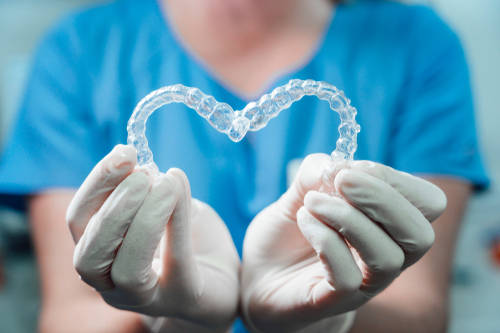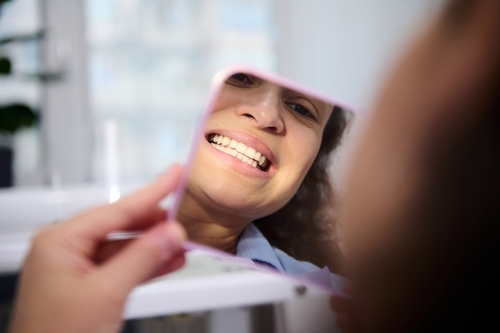
by sld | Jul 8, 2024 | Emergency Dental Care
Emergency dental situations demand immediate attention, not only to alleviate pain but also to prevent potential long-term damage to your oral health. At Smile League Dental in Joliet, Illinois, our highly skilled team, equipped with the latest technology, is ready to handle a range of urgent dental issues with the precision and care that our patients deserve. Understanding the types of emergencies that warrant immediate dental care can help you take the right action without delay.
When faced with severe dental pain, lacerations to the gums, cheeks, lips, or tongue, or any similar acute discomfort, it is crucial to seek professional help immediately. Such conditions not only cause significant pain but also pose risks of infection or more severe complications if not treated promptly. At Smile League Dental, we prioritize your comfort and health, ensuring that you receive the necessary care as quickly as possible.
Loose Teeth
Among the common emergencies we handle at Smile League Dental are loose teeth. Each of these situations can arise from various incidents, such as accidents, sports injuries, or the sudden onset of infection. Our team is trained to provide a specific approach to treatment for each of these emergencies. For instance, a loose tooth, whether due to trauma or infection, may need to be stabilized or possibly reattached to prevent tooth loss. Immediate professional assessment is critical to determine the best course of action and to maximize the chances of a favorable outcome.
Dental Abscess
Another emergency that demands urgent care is a dental abscess, an infection at the root of a tooth or between the gum and a tooth. This condition can lead to severe, throbbing pain, swelling, and general illness. Treatment typically involves draining the abscess and addressing the infection with antibiotics, followed by further dental work to ensure the health of the affected area is restored.
Broken Teeth
Severe toothaches and significantly damaged teeth (whether broken, cracked, or chipped) also require emergency dental services. These issues often point to underlying problems such as decay, infection, or structural damage to the tooth. Addressing these symptoms promptly can prevent further deterioration and more complex dental problems down the line.
At Smile League Dental, our emergency services include not just pain management and temporary restorations, but also comprehensive plans for permanent solutions based on a detailed evaluation of the tooth’s condition, ensuring a thorough and effective approach to your dental health.
The treatment approach for a broken tooth can vary significantly depending on the extent of the break. Minor fractures may need only a dental filling or a crown, but more severe breaks, especially those that expose the tooth’s inner layers, may require root canal therapy or, in extreme cases, extraction.
Your Pain Relief Matters To Smile League Dental
For all these emergencies, Smile League Dental offers advanced treatment options and utilizes state-of-the-art technology to ensure the best care. Our dentist and dental assistants are committed to providing immediate and effective treatments to relieve pain, restore dental health, and prevent complications.
If you are experiencing any of the dental emergencies mentioned, do not hesitate to contact Smile League Dental at 815-782-6243 for swift and professional emergency dental care in Joliet. At Smile League Dental, located at 3587 Hennepin Dr, Joliet, IL 60431, we are here to assist you in your time of need, ensuring your dental health is promptly and effectively managed. We are dedicated to restoring your comfort and dental health with the highest level of care.

by sld | Jun 15, 2024 | Dental Implants
Dental implants represent a significant advancement in dental care, providing a durable and aesthetically pleasing solution for missing teeth. However, for many patients considering this treatment, the cost can be a major concern, particularly for those who rely on Medicaid. In Illinois, Medicaid coverage for dental services can be complex, and understanding whether it includes dental implants requires a nuanced examination of state policies and available options.
Medicaid Coverage Varies By State
Medicaid is a joint federal and state program that offers healthcare coverage to eligible low-income adults, children, pregnant women, elderly adults, and people with disabilities. The scope of dental coverage under Medicaid varies significantly from one state to another and is often limited to essential services. Typically, Medicaid dental coverage focuses on cost-effective treatments deemed medically necessary, with an emphasis on preventative and basic dental care to mitigate more severe health issues.
In Illinois, Medicaid dental benefits are administered through managed care organizations (MCOs) that contract with the state. These MCOs provide a range of dental services under the HealthChoice Illinois plan. As of the latest updates, the inclusion of dental implants under Medicaid is generally rare, as they are often considered elective rather than essential. Medicaid’s primary goal in dental care is to prevent disease and address acute dental issues that could lead to more significant health problems if untreated.
However, it’s important to note that there are exceptions where dental implants might be covered if deemed medically necessary. For instance, if a patient has undergone significant facial trauma or has a condition that has led to severe jawbone deterioration, implants might be essential to restore basic oral functions and prevent further health complications.
In such cases, obtaining coverage for dental implants under Medicaid requires thorough documentation from a dental professional to demonstrate medical necessity. The process involves detailed medical records, a clear treatment plan, and often, a prior authorization request submitted to the Medicaid program. This information can provide reassurance and a sense of clarity for those considering dental implants.
Medicaid For Dental Implants In Illinois
For Illinois residents considering dental implants and relying on Medicaid, it is of utmost importance to seek guidance from a qualified dental professional. They can provide a comprehensive assessment and expertly navigate the intricacies of Medicaid coverage. At Smile League Dental, patients can receive a thorough evaluation to determine the best course of treatment and understand the financial options available, including exploring the scope of Medicaid coverage.
Patients should also be aware of the potential for financial assistance. Some nonprofit organizations and dental schools offer reduced rates for implants as part of training programs for dental students. Additionally, third-party financing options might be available to help manage the costs of such treatments. This can provide a sense of hope and relief for those concerned about the financial aspect of dental implants.
Your Road To A Confident Smile Begins With Smile League Dental
For individuals seeking dental implants, the journey to a restored smile can be filled with various financial and medical considerations, particularly when relying on Medicaid. It is advisable to engage with dental professionals who can provide clear, personalized guidance tailored to your specific health needs and financial circumstances. At Smile League Dental, we are committed to helping our patients navigate these challenges and work towards achieving the best possible outcomes for their dental health.
Choosing Smile League Dental means choosing superior care and a commitment to your enduring oral well-being. Your journey to a confident, beautiful smile starts with a call to Smile League Dental in Joliet, Illinois. Contact Smile League Dental to discuss our dental implant service in Joliet at 815-782-6243 and take the next step toward your dream smile. We also serve the communities of Bolingbrook, Crest Hill, Lockport, New Lenox, Shorewood, Elwood, Romeoville, Homer Glen, Plainfield, and, Channahon.

by sld | Mar 26, 2024 | Cosmetic Dentistry
SmileDirectClub, which gained popularity for offering clear dental aligners as a convenient and affordable alternative to traditional braces, is now closing its doors. The company has served over two million customers since its inception in 2014. Unfortunately, despite its initial promise, SmileDirectClub struggled financially, reporting losses of $86.4 million in 2022 and eventually filing for Chapter 11 bankruptcy protection.
Smile Direct Customers Left In State Of Uncertainty
Existing SmileDirectClub customers have been left in a state of uncertainty. The company’s telehealth aligner treatments are no longer available, and customer orders that still need to be shipped have been canceled. The “Lifetime Smile Guarantee” has also been discontinued, further adding to the confusion. SmileDirectClub suggests that Smile Pay customers should continue making payments, compounding the frustration for many.
Moreover, customer-care support is no longer provided. The company has advised customers to consult their local dentists or orthodontists for alternative treatments. Details about potential refunds are pending and will be determined as part of the bankruptcy process.
SmileDirectClub’s closure means they must liquidate their assets, raising concerns about whether customers will receive compensation. Unfortunately, those who signed up or made payments after the company’s bankruptcy filing in September will likely be prioritized, leaving many early customers without recourse.
Dr. Myron Guymon, President of the American Association of Orthodontists, speculates that tens of thousands of individuals could be affected by SmileDirectClub’s closure. Many of these individuals have invested time and money in their treatment, only to find themselves without ongoing care.
The Perils Of DIY Dentistry
Over the years, dental associations worldwide have raised concerns about direct-to-consumer aligner treatments, often referred to as “DIY” dentistry. These treatments do not require in-person visits to a dentist or orthodontist, potentially leading to overlooked oral health issues. Many former direct-to-consumer aligner patients eventually seek orthodontic care for reevaluation, often discovering problems like gum disease and bite issues.
SmileDirectClub is one of many direct-to-consumer dental aligner providers on the market, but concerns persist about the need for more direct supervision and patient-doctor relationships. This business model raises questions about patient safety and the ability to address problems promptly.
While teledentistry can improve access to dental care, it should be within established safety guidelines. Patients can benefit from remote monitoring between in-person treatments, but it’s crucial to maintain a patient-doctor relationship to ensure the best possible outcomes for orthodontic treatment.
Reliable Alternatives For Aligner Treatments
In light of SmileDirectClub’s closure, it’s crucial for individuals seeking aligner treatments to explore reliable alternatives. One such option is “Smile League Dental” in Joliet, Illinois, where you can expect personalized care and unwavering support throughout your orthodontic journey.
At Smile League Dental, you’ll benefit from a team of experienced professionals who prioritize your oral health and well-being. They understand that orthodontic treatment is not just about achieving a straighter smile but also about maintaining your overall oral health. With their guidance, you can rest assured that your treatment will be carried out safely and effectively.
Your Journey to Confidence Begins With Smile League Dental
Choosing Smile League Dental means choosing quality care and a commitment to your long-term oral health. Don’t let SmileDirectClub’s closure deter you from achieving the smile you’ve always wanted. Your journey to a confident, beautiful smile begins with a call to Smile League Dental in Joliet, Illinois. Contact our dental aligner professionals in Joliet at 815-782-6243 to learn more about your options and take the next step toward your dream smile.

by sld | Feb 20, 2024 | Dental Service
It can be all too easy to downplay the importance of preventive dentistry until it’s too late and you’ve lost a tooth or have to undergo a surgical procedure. Maintaining optimal oral health goes beyond addressing dental issues as they arise. It’s important to be proactive and prevent dental problems before they occur. Let’s shed some light on the importance of preventive dental care in preserving your teeth, gums, and overall well-being. Here are seven reasons that preventive dentistry is so important:
Early Detection of Problems
A big part of preventive dentistry is scheduling regular dental check-ups. This allows your dentist to detect potential issues in their early stages. Conditions such as cavities, gum disease, and oral cancers are more manageable when identified early. By addressing concerns at their inception, you can often avoid more extensive and costly treatments in the future.
Gum Disease Prevention
Gum disease is a common oral health issue that, when left untreated, can lead to serious complications. It’s important to brush and floss your teeth every day to remove plaque and tartar—the primary culprits behind gum disease. Professional dental cleanings further aid in preventing the progression of gum disease, ensuring your gums remain healthy and resilient.
Cavity Prevention
During your dental appointments, your dentist can identify early signs of tooth decay and provide interventions, such as fluoride treatments and dental sealants, to strengthen and protect your teeth. This proactive approach helps avoid the need for more invasive treatments like fillings or root canals.
Oral Cancer Screening
Preventive dentistry can include routine oral cancer screenings during dental check-ups, depending on your risk factors. Early detection of oral cancer significantly improves treatment outcomes. Your dentist is trained to identify suspicious signs and symptoms, and regular screenings contribute to the timely diagnosis and management of this serious condition.
Aesthetic Preservation
Beyond the functional aspects of your teeth, preventive dentistry also focuses on preserving the aesthetics of your smile. Professional cleanings, teeth whitening, and other preventive measures help maintain the brightness and attractiveness of your teeth.
Cost Savings
A preventive approach to oral health is a cost-effective strategy in the long run. Regular check-ups and cleaning, combined with early interventions, can prevent the development of more severe dental issues that could otherwise require extensive treatments. Investing in preventive care ultimately saves you both time and money by minimizing the need for complex and costly dental procedures.
Long-Term Oral Health Benefits
When you prioritize preventive dentistry, you are investing in your long-term oral health. Regular dentist visits and good habits contribute to a lifetime of healthy teeth and gums. This enhances your quality of life and protects you from systemic health issues associated with poor oral health.
Preventive Dentistry in Joliet
Prioritizing regular dental check-ups is a critical part of maintaining your oral health. Smile League Dental is the top-rated dentist in Joliet. Our passion is making sure that each one of our patients has the healthiest mouth and the brightest smile possible. Contact Smile League Dental today at 815-782-6243 to make an appointment to visit us and talk about how to be proactive with your oral health.

by sld | Jan 23, 2024 | Emergency Dentist
Emergencies don’t follow a schedule, and a broken tooth can happen at any time. Breaking a tooth is never pleasant, but knowing what to do when it happens can make a huge difference in reducing stress and preserving your oral health. Here’s a step-by-step guide on what to do if you break a tooth after hours.
Remain Calm
The first and most crucial step is to stay calm. It can be scary to break a tooth, but panicking can hinder your ability to take the necessary steps for immediate care. Take a deep breath and approach the situation with a clear mind.
Assess the Damage
Examine the extent of the damage. Is it a minor chip, a fracture, or a completely knocked-out tooth? Inspect the tooth carefully so you can communicate effectively with the dentist when seeking assistance.
Rinse Your Mouth
Gently rinse your mouth with warm water to remove any debris or blood. Be cautious not to use hot or cold water, as your broken tooth can be temperature-sensitive. If there is bleeding, use a clean cloth or gauze to apply gentle pressure to the affected area.
Save Any Tooth Fragments
If the broken tooth has left fragments, try to save them, if you can. Place the pieces in a container with milk or your saliva. This can potentially aid in the dentist’s ability to repair or restore the tooth.
Use a Cold Compress
Apply a cold compress to the outside of your mouth, near the affected area. This can help reduce swelling and alleviate pain.
Take Over-the-Counter Pain Relief
If you’re experiencing pain, you can take over-the-counter pain relievers like acetaminophen or ibuprofen according to the recommended dosage. Avoid placing aspirin directly on the affected area, as it may cause irritation.
Contact Your Dentist
Even if it’s after regular office hours, call your dentist immediately. Many dental practices have emergency contact information for situations like these. Explain the situation, and they can provide guidance on the next steps and whether you should seek immediate care.
Visit an Emergency Dental Clinic
If you cannot reach your regular dentist, consider visiting an emergency dental clinic. These facilities are equipped to handle urgent dental issues and can provide the necessary care outside of regular office hours.
Stay Hydrated
While awaiting dental care, it’s essential to stay hydrated. Drink plenty of water to maintain moisture in your mouth, especially if you’re unable to eat due to the injury.
Follow Post-Care Instructions
After receiving dental care, follow any post-care instructions provided by your dentist. This may include avoiding certain foods, taking prescribed medications, and attending follow-up appointments.
Contact Smile League Dental
If you’re looking for a reliable emergency dentist in Joliet, look no further than Smile League Dental. Our friendly professionals offer same-day care for emergency situations. Your oral health is our top priority at any time of day. Give us a call anytime at 815-782-6243. A broken tooth can be a distressing experience, but with the right steps and prompt attention, you can increase the chances of a successful outcome.






Recent Comments